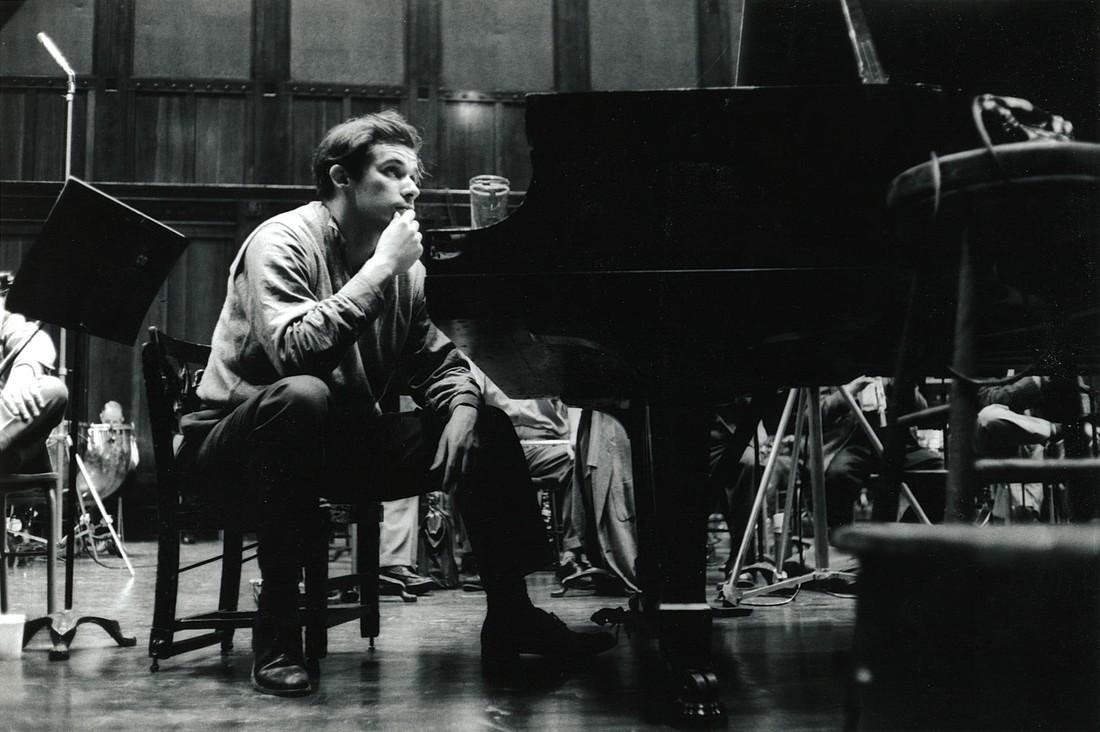
A department store is not the most obvious place for a concert hall. Yet one of Toronto’s finest venues found its location atop one.
On the seventh floor of the flagship location of Eaton's department store at College and Yonge Street, the aptly named Eaton Auditorium hosted a veritable who’s who of mid-century classical musicians. Audiences and artists alike adored the venue for its style and its acoustics.
Eaton's College Street
The surprising location for the Eaton Auditorium resulted from the vision of Lady Flora McCrea Eaton, whose father-in-law, Timothy Eaton, had founded the business in 1869. Eaton's store changed the way Canadians shopped, with his innovative catalogue and luxurious department stores.To compete with nearby businesses, the company designed a new building on Yonge Street in the trendy Art Moderne style of the 1930s. The new design focused on providing just as much public space as store space in an attempt to draw in more potential customers through its doors.
Made up of a series of galleries, Eaton's College Street location was crowned by its seventh floor, which featured a luxury restaurant, cafeteria, and concert hall auditorium. The Eaton Auditorium had 1,264 seats on two floors, all upholstered in gold.
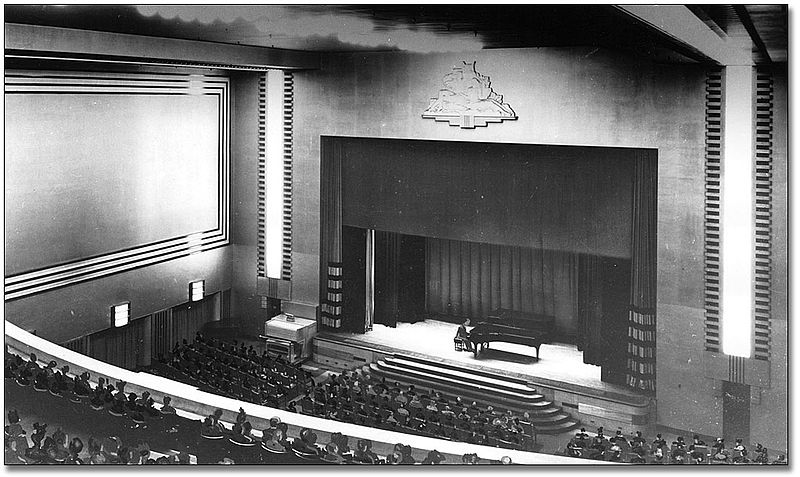
Courtesy of the Archives of Ontario, Eaton's Auditorium, T. Eaton Company fonds, F 229-308-0-61
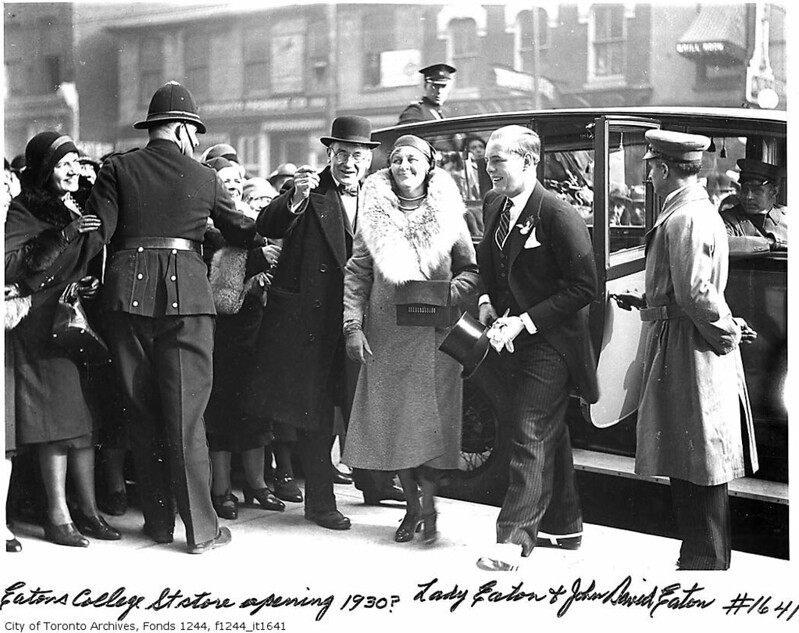
John David Eaton and his mother, Lady Eaton, at the opening of their College Street location, 1930.
Photograph by William James. Courtesy of the City of Toronto Archives. Fonds 1244, Item 1641
A Service to Music
The Auditorium opened in March 1931 with Ernest MacMillan at the organ. MacMillan would go on to conduct the Toronto Symphony Orchestra as well as the Toronto Mendelssohn Choir at Massey Hall. He later became Dean of the University of Toronto, Faculty of Music and was knighted by King George V in 1935 for his "services to music in Canada."
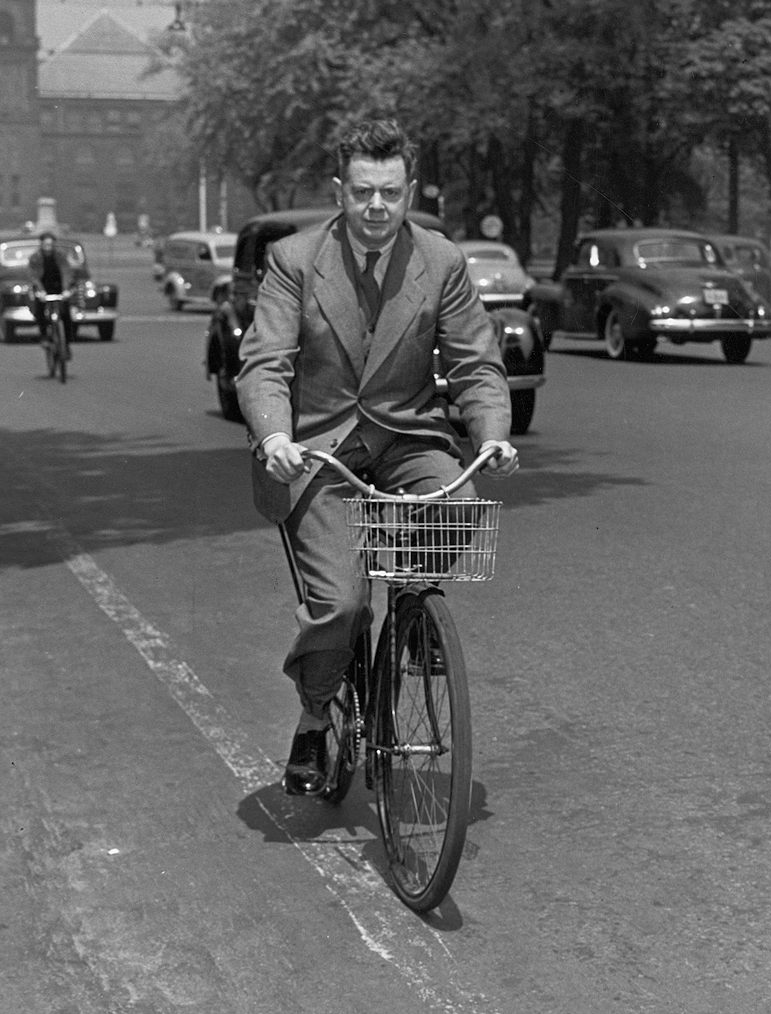
Sir Ernest MacMillan rides his bike down University Avenue in 1942. According to the Toronto Star, he was leaving the Toronto Conservatory of Music for lunch.
Courtesy of the City of Toronto Archives, Series 1569; File 11, Item 1
A Waitlist for Music
The venue’s popularity was immediate, with its acoustics compared to New York’s Carnegie Hall. A subscription season of classical music recitals, dance, opera, and plays began in October 1932. Within two years, the waitlist for Eaton Auditorium season subscriptions numbered into the hundreds.
Piano luminaries such as Rudolf Serkin and Arthur Rubenstein requested to perform at the Eaton Auditorium instead of Massey Hall. The Eaton Company’s Operatic Society used the venue for annual Gilbert and Sullivan shows, the Women’s Musical Club of Toronto hosted concerts, and the National Ballet of Canada made its debut on the Auditorium stage.
There is no use in wounding any further the lacerated feelings about about 2,000 people who would like to attend, but cannot possibly be accommodated.
— The Globe and Mail, October 20, 1934
Portia White
Born in Nova Scotia and raised singing in church choirs and on her father's radio show, Portia White (1911–1968) was the first Black Canadian opera singer to perform at the Auditorium.
The 22-year-old Maritime-trained contralto (the lowest register for a female singer) packed the house. Portia broke the colour barrier in Canadian classical music and was immediately offered a concert contract to tour North and South America. Throughout her internationally celebrated career, she kept her debut at Eaton Auditorium close to her heart and felt "it was Toronto which discovered me."
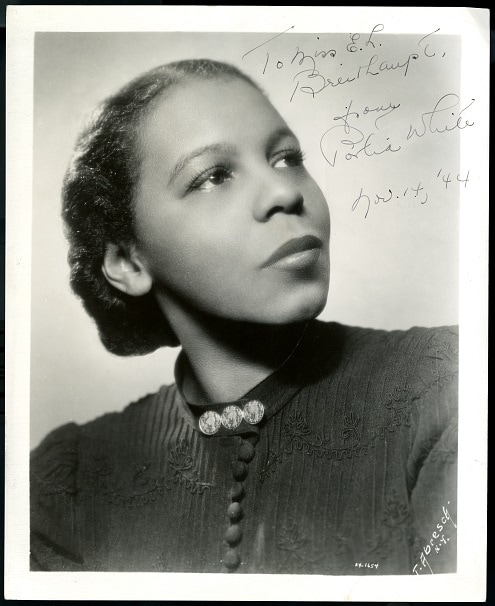
In 1944, at the height of her career, Portia White autographed this portrait for Kitchener resident Lillian Breithaupt. It was later donated to the Breithaupt Heweston Clark Collection at the University of Waterloo.
Courtesy of the University of Waterloo Archives
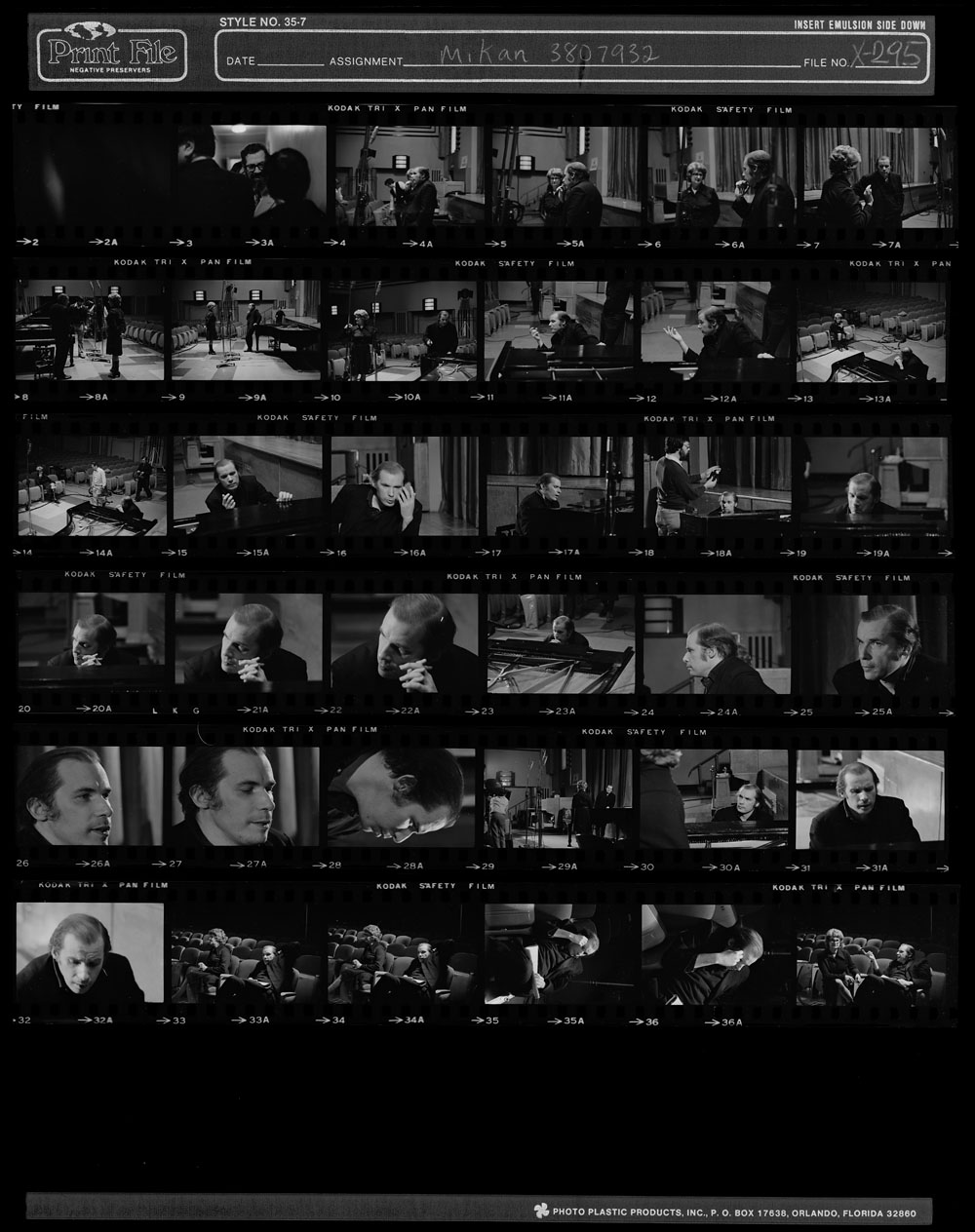
Explore this contact sheet from the National Film Board’s filming of Glenn Gould at the Eaton Auditorium. The multiple photos provide a snapshot of how Gould interacted with the space as a performer.
Courtesy of the Library and Archives Canada, R11224-356-0-E
Glenn Gould
Toronto also discovered another world-class musician at the Eaton Auditorium: Glenn Gould. He first appeared on the stage in 1945 at age 13, one of three young performers at the Casavant organ for a Christmas concert. Two years later, Gould performed again at the Eaton Auditorium: this time to make his official solo debut as a professional pianist. The Globe and Mail concluded that the recital “should qualify him for a rank among leading adult artists,” while the Toronto Star declared “this boy is on the road to pianistic fame."
Gould often returned to the Eaton Auditorium to record, even into the 1970s when the Auditorium had formally closed. Semi-abandoned and offering no heat or light, recording teams rigged up a lightbulb and brought in space heaters so Gould could play in his favourite venue.
The End of Eaton's College Street
With the opening of the popular Eaton's Centre in 1976, Eaton's College Street location closed and the site was purchased by a developer, who converted the land into a mixed-use complex. A premise of the sale was that the Auditorium would be maintained. Despite its protection under the Ontario Heritage Act, the space sat vacant over a period of several decades. Jacques Carlu's architectural vision fell into disrepair.
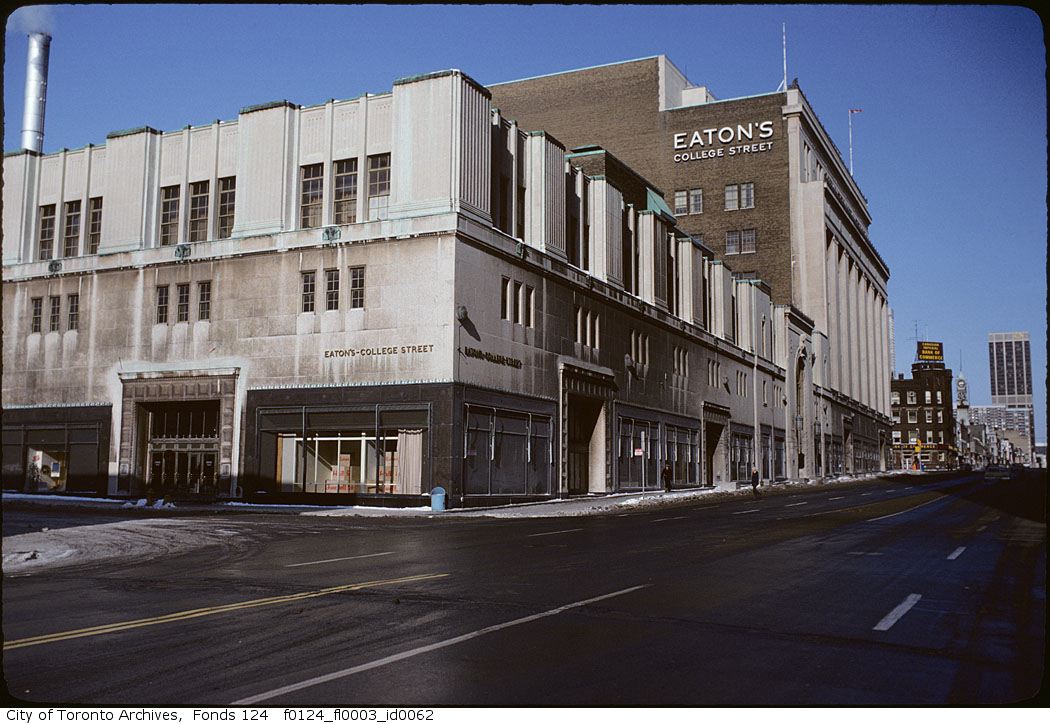
A view of Eaton's College Street location, including the Auditorium. Date unknown.
Courtesy of the City of Toronto Archives Fonds 124, File 3, id 62
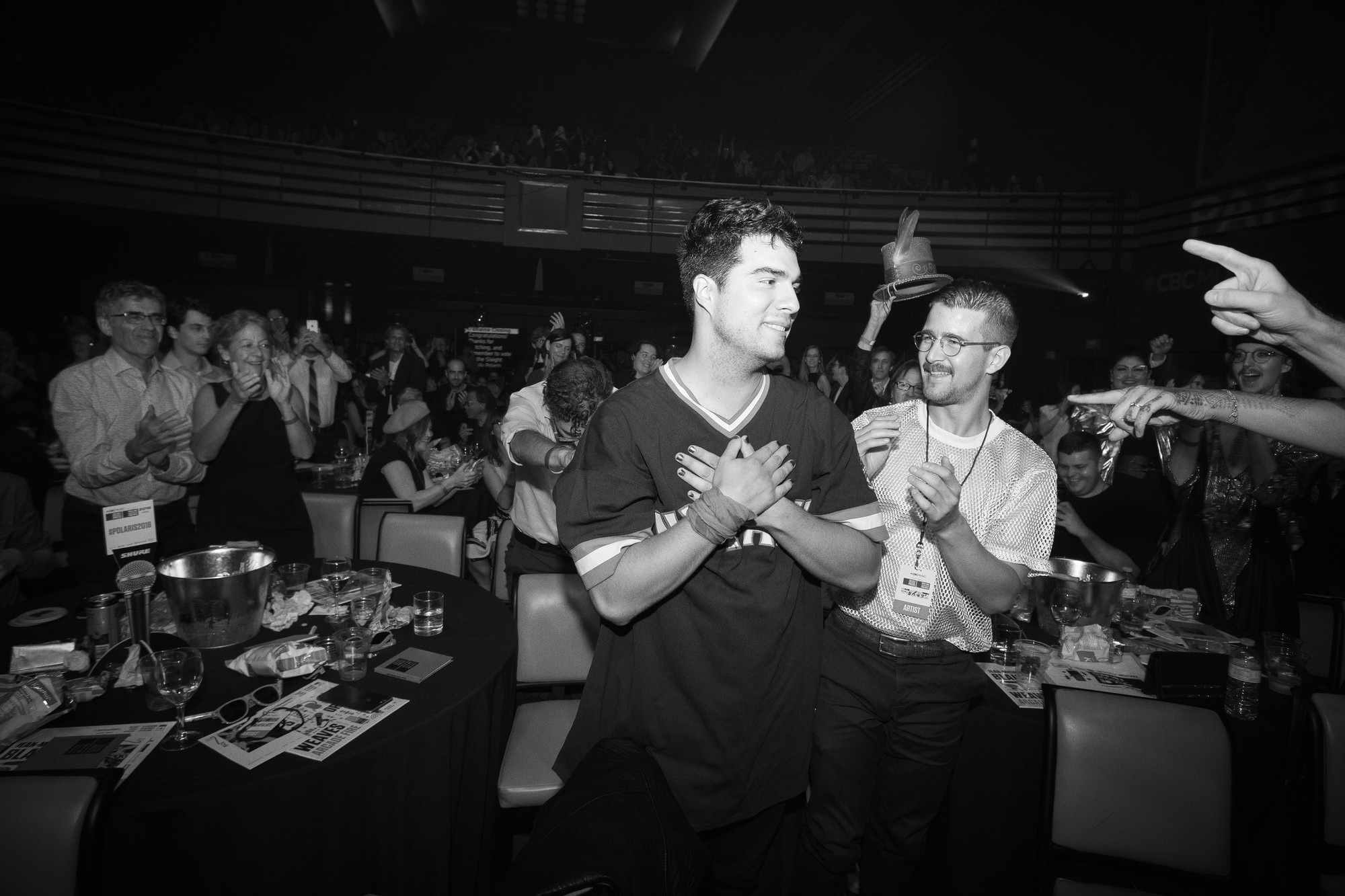
Jeremy Dutcher is announced as the 2018 Polaris Prize award for album 'Wolastoqiyik Lintuwakonawa' at The Carlu, Toronto.
Photo by Dustin Rabin, courtesy of the Polaris Music Prize
The Carlu
The seventh floor of College Park sat vacant until 2003 when Jeffry Roick and Mark Robert restored and reopened the space as The Carlu. ERA Architects and WZMH Partnership rehabilitated the Art Moderne aspects of the National Historic Site, which received provincial and national awards for craftsmanship. In the years that have followed, The Carlu has hosted private events and receptions.
Beginning in 2013, the Polaris Music Prize has held its annual gala at The Carlu, showcasing Canadian talent on the same stage that had previously hosted so many luminaries. Who would have ever thought that this glamorous stage built for classical and opera would equally celebrate Buffy Sainte-Marie, Lido Pimentia, Jeremy Dutcher, and Haviah Mighty?
A Polaris Performance
Twice nominated for the Polaris Music Prize, hip hop artist Shad performs from his 2019 Polaris nominated album "Short Story About a War". The live performance features an appearance from 2017 Polaris Music Prize winner Lido Pimentia.
This online exhibition uses third-party applications including Spotify and YouTube. Check with your organization’s web administrator if you are unable to access content from these channels in the exhibition.

Courtesy of CBC Music. Please note: this third-party video does not provide closed captions.
View Transcript[A pan of a light-strewn stage with a man holding a microphone. Behind him are a selection of musicians. The lights strobe and change colour as he sings.]
Get it, got it, good (I got you, I got you)
Get it, got it, good
They can't kill us, 'cause they can't see us, 'cause they only see fear They steal
Then they take your memory of the theft
Magic
This show will literally take your breath
Joker in the deck
The Devil and his magic
(Devil and his magic)
The Devil and his magic
(Devil and his magic)
See it's kinda like magic, huh
They cause a distraction then poof
All that we have disappears and we clap
Then forget that it happened
Forgot that we lost it
Forgot that the magic men have it
They grabbed it, they stole it, they cause a distraction
Distraction, distraction, (Why?) it's all a distraction
Imagine, like magic
Gone is our land, our language, our history
Ancestry, families vanish like it was magic
Gone is our greatness, our sacred places
And practices, suddenly we feel vacant
We saw them take it though
Our hands lift from the earth
The dirt, from the food removed, rezoned, reduced, reduced to-
Disappeared, it's all smoke and mirrors
All of it's magic
The Devil and his magic
All of it's magic
The Devil and his magic
Distraction, distraction
The way that they take
The way of magicians is in addition to subtraction
They used to vision, they mastered the craft of it
Listen, see through the illusions
And all the amusements
They divide humans up causing confusion
They use competition, religion
It's all just division, man
All of it's magic (All of it's magic)
Splitting us into factions
Fighting until we're fractured
Smaller and smaller fractions
People feeling like zero
Individuals divisible to the point we're invisible
Gone into ghettos and armies and prisons
We won't be missed, they easily dismiss us
They dissolve if you give them munitions
And the rest they condition and kill by attrition
All of it's magic
The Devil and his magic
All of it's magic
The Devil and his magic
[Bridge: Lido Pimienta]
All of it's magic (La, la, la, la, la, la, la)
All of it's magic
All of it's magic
All of it, all of it's magic, magic, magic
[Verse 3]
See them make up stats that make us scrap for the scraps
They have all of it, all of it
All of it's magic
Grabbing at hat tricks, they're practicing, crafty
The fastest, you had it and then suddenly
Gone is your work, your purpose, your worth
The reason you wake, your sense of seizing your stake in it
Your traditions and intuitions
Supports, commitments, decisions
They vanish from your hands like
Your volition, your voice, your vision, your choice
Your joys, you miss your mission, attention gone
To fast cars and fast fashion
Fast food and no fasting
All distractions
The light blinds and the fear blinds
And the cash binds and just gotta keep them confined until
Reality's so hard to look at
That we turn a blind eye
Don't even care that they took it
The Devil and his magic
The Devil and his magic
The Devil and his magic
Get it, got it, good
They can't kill us, 'cause they can't see us, 'cause they only see fear
Get it, got it, good (we're fearless)
Damn, it feels good to be back
Damn, it feels good to be black
They keep on killing us
We just keep killing it
Mama said killin' is not where the healin' is
Couldn't speak back
Lord knows she been through it
She said a human is not who the villain is
She said it's fear, it's greed, and it's pride
You see it inside
That's what this system is built on
And what it instills in us
Man, I've been feeling this vibe
Honestly, the haters can hate
Just let the creators create
And let the creator be judge
I mean too many mistakes to be grudging
Beside, all of us lost without love
'Cause maybe some never get woke
Or tire of staying awake
Or party all night, then distraught at the state of the day
Lord what do you make of this way that I'm walking
This path that I'm on, you made a way for me
Hope that my map isn't wrong, nowadays my legs is weak
What if my staff isn't strong, what if it breaks
Uh, who got me? Uh, you got me! Uh!
I know that you got me good
Get it, got it, good
Get it, got it, good
Get it, got it, good
Get it
Get it, got it, good
Get it, got it, good
Get it, got it, good
Get it, got it, good
I'm talking 'bout wavy
I'm talking 'bout ways we can elevate
Stepping up stair and we escalate
Don't try to separate, we'll get together and celebrate
I can do everything, I just don't hesitate
I can do anything, allow me to demonstrate
I just can't wait, I just can't not be me
I just can't go back and copy me
I just can't not be free
I just can't possibly
Lesson on lessons
Legends on legends on legends
Little black boy with a poem that he showed to the reverend
Jesus saw Judas and ran up to hug the young brother
It dug at the other eleven
Like "why is this traitor in heaven"
He said it's hell on earth anywhere love isn't present
Wherever he goes, we go together my brethren
Get it?
Get it, got it, good!
Get it, got it, good!
Get it, got it, good!
Get it, got it, good!
Get it, got it, good!
Get it, got it, good!
Get it, got it, good!
Get it, got it, good!
They can't kill us, 'cause they can't see us, 'cause they only see fear
They can't kill us, 'cause they can't see us, 'cause they only see fear
Wanna be free?
Just answer one question, but answer honestly
What are you afraid of?
Dive Deeper
Bruce Allen Kopytek, Eaton's: The Trans-Canada Store. Cheltenham: The History Press, 2014.

